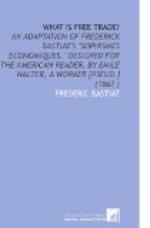We forget that international exchanges, no more than individual exchanges, work by weight or measure. We do not exchange a bale of cotton for a bale of lace collars, nor a pound of wool in the grease for a pound of wool in cashmere; but a certain value of one of these things for an equal value of the other. Now to barter equal value against equal value is to barter equal work against equal work. It is not true, then, that the nation which gives for a hundred dollars cashmere or collars, gains more than the nation which delivers for a hundred dollars wool or cotton.
In a country where no law can be adopted, no impost established, without the consent of those whom this law is to govern, the public cannot be robbed without being first deceived. Our ignorance is the “raw material” of all extortion which is practised upon us, and we may be sure in advance that every sophism is the forerunner of a spoliation. Good public, when you see a sophism, clap your hand on your pocket; for that is certainly the point at which it aims. What was the secret thought which the shipowners of Bordeaux and of Havre, and the manufacturers of Lyons, conceived in this distinction between agricultural products and manufactured articles?
“It is principally in this first class (that which comprehends raw material unmodified by human labor),” said the Raw-Materialists of Bordeaux, “that the chief aliment of our merchant marine is found. At the outset, a wise economy would require that this class should not be taxed. The second (articles which have received some preparation) may be charged; the third (articles on which no more work has to be done) we consider the most taxable.”
“Consider,” said those of Havre, “that it is indispensable to reduce all raw materials one after another to the lowest rate, in order that industry may successively bring into operation the naval forces which will furnish to it its first and indispensable means of labor.” The manufacturers could not in exchange of politeness be behind the ship-owners; so the petition from Lyons demanded the free introduction of raw material, “in order to prove,” said they, “that the interests of manufacturing towns are not always opposed to those of maritime ones!”
True; but it must be said that both interests were, understood as the petitioners understood them, terribly opposed to the interests of the country, of agriculture, and of consumers.
See, then, where you would come out! See the end of these subtle economical distinctions! You would legislate against allowing perfected produce to traverse the ocean, in order that the much more expensive transportation of rough materials, dirty, loaded with waste matter, may offer more employment to our merchant service, and put our naval force into wider operation. This is what these petitioners termed a wise economy. Why did they not demand that the firs of Russia should be brought to them with their branches, bark, and roots; the gold of California in its mineral state, and the hides from Buenos Ayres still attached to the bones of the tainted skeleton?




